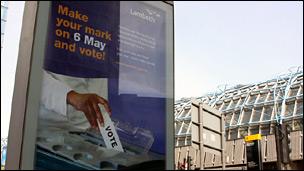New individual voter system has real risks, MPs say
- Published

Currently, the head of a household can be fined up to £1,000 for failing to register all eligible voters
Changes to the way people register to vote could "damage democracy" by resulting in large numbers dropping off the electoral roll, MPs have warned.
The Political and Constitutional Reform Committee, external says there are "real risks" involved in the planned change from household to individual registration.
The MPs want it to be an offence for individuals not to register to vote.
The government says it is "putting safeguards in place" to prevent people dropping off the electoral roll.
Currently, the head of a household can be fined up to £1,000 for failing to register all eligible voters at his or her property.
The government wants to switch to a system in which individuals register themselves, but does not think there should be a similar legal penalty for those who fail to do so.
Jury duty
The committee's report says it welcomes the principle of individual elector registration (IER), but believes there is a danger that the number of people registered to vote could fall significantly if it is implemented in the way the government plans.
It says some people may choose to opt out for reasons like avoiding jury duty, and warns that urban areas, with a rapid population turnover, are likely to be the worst affected.
In Northern Ireland, where IER is already in place, failing to register to vote is an offence and the committee says the same should be true in the rest of the UK.
It suggests that penalty could be phased out after five years once the new system has bedded down.
The potential problem of voter drop-out could be compounded, the MPs say, by the government's decision not to hold an annual canvass in 2014.
The report says this could lead to inaccuracies in the electoral roll for 2015 and also have "a marked and potentially partisan effect on the parliamentary constituency boundaries" for 2020 which will be based on that roll.
The chairman of the committee, Labour's Graham Allen, said: "Getting individuals to take responsibility for their own votes is the right thing to do, but it needs to be done in the right way.
"The transition to individual registration will only be a true success if the electoral rolls become not only more accurate but also more complete.
"The amendments which we propose - especially on the 2014 canvass and on not opting out - are essential if IER is to command public confidence and not to be seen as unfair and politically partisan."
Home visits
A Cabinet Office spokesman said the move to IER would modernise the electoral system and help to combat fraud.
"We are putting safeguards in place to stop people dropping off the register, as well as looking at ways we can increase registration levels," he said.
"Under the new system, everyone will be invited to register in 2014 and will receive a number of reminders - if they do not respond they will then be visited at their home by an electoral registration officer to ask them to register.
"In addition, there will be publicity to make people aware of the change and we are looking at opening up new ways of registering, including online registration."
Under Labour there were plans to introduce IER from 2015 at the earliest, but the coalition's plan to bring it forward to 2014 for new voters is designed to save £74m.
But Labour argues that accelerating the process risks disenfranchising millions.
Deputy leader Harriet Harman told the party's conference in September the Tories were "hoping" that "if they take away the right to vote from students, young people living in rented flats in our cities, people from ethnic minority communities" it will help their chances of re-election.
- Published11 October 2011
- Published29 September 2011
- Published15 September 2010